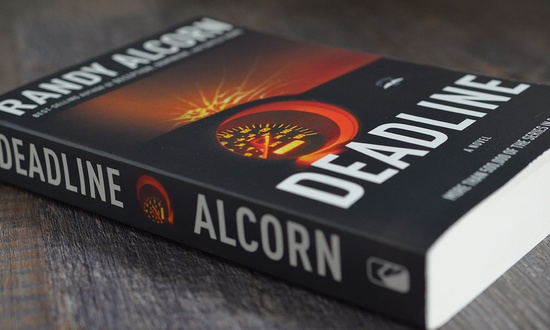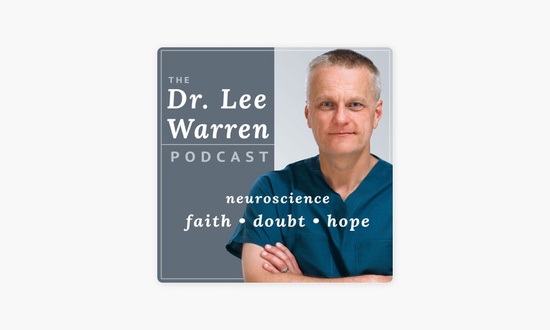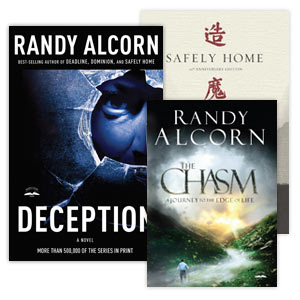 I’ve written thirteen works of fiction, four large, five medium and four small. I enjoy writing a variety of genres, including murder mysteries (Deadline, Dominion and Deception), contemporary fiction (Safely Home, Courageous), spiritual warfare (Lord Foulgrin’s Letters, The Ishbane Conspiracy) other world fantasy (Edge of Eternity and The Chasm), and children’s stories (Tell Me About Heaven and Wait Until Then).
I’ve written thirteen works of fiction, four large, five medium and four small. I enjoy writing a variety of genres, including murder mysteries (Deadline, Dominion and Deception), contemporary fiction (Safely Home, Courageous), spiritual warfare (Lord Foulgrin’s Letters, The Ishbane Conspiracy) other world fantasy (Edge of Eternity and The Chasm), and children’s stories (Tell Me About Heaven and Wait Until Then).
I loved writing my graphic novels Eternity and The Apostle because they speak the heart language of many, both young and old. The fantastic art is appealing and helps readers, including children and those who speak English as a second language, engage with and understand the words.
Counting my book Grace (releasing July 2016), of my twenty-nine nonfiction books still in print, six are large, seven medium and sixteen small. (My largest is Eternal Perspectives, a collection of Heaven and New Earth quotations that I believe are life-changing!)
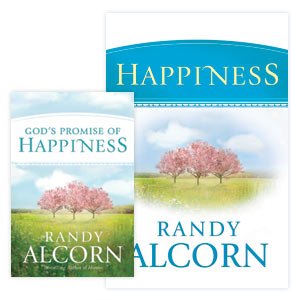 Last month I came out with two books. Happiness is a comprehensive study of what the Bible and God’s people throughout church history have said about happiness, joy, gladness and delight. It’s 444 pages, plus two appendices and lots of endnotes. The second is a small book, God’s Promise of Happiness, 92 pages, which most people could read in an hour.
Last month I came out with two books. Happiness is a comprehensive study of what the Bible and God’s people throughout church history have said about happiness, joy, gladness and delight. It’s 444 pages, plus two appendices and lots of endnotes. The second is a small book, God’s Promise of Happiness, 92 pages, which most people could read in an hour.
I’m looking forward to completing a medium-sized devotional called 60 Days of Happiness. And because Heaven for Kids has been well-received, I’d love to write Happiness for Kids.
Why write different sized books on one subject? Because they’re designed to reach different audiences with varying interests and preferences. The big books are for pastors, teachers and serious Bible students who want to dig in and explore the depths of what Scripture and theologians say. They’re not meant for those who want a quick read and prefer small books or devotionals.
Likewise, those who want a thorough treatment of a subject want more than what small books offer. As in The Three Bears, for some the small version is “just right.” But the right fit for Baby Bear or Goldilocks is the wrong fit for Papa or Mama Bear!
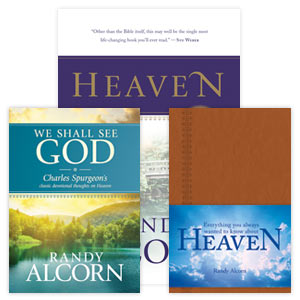 When I wrote Heaven for Kids and Tell Me About Heaven, I drew from my extensive research for the big Heaven book, and added things unique to each of those small books. I wrote 50 Days of Heaven by selecting the material most suitable for a devotional, then rewriting it in a different style. Everything You Ever Wanted to Know About Heaven is the Reader’s Digest version of Heaven, written for adults but with simplified wording. In We Shall See God, I took excerpts from Charles Spurgeon’s great sermons on Heaven, and supplemented them with my own meditations.
When I wrote Heaven for Kids and Tell Me About Heaven, I drew from my extensive research for the big Heaven book, and added things unique to each of those small books. I wrote 50 Days of Heaven by selecting the material most suitable for a devotional, then rewriting it in a different style. Everything You Ever Wanted to Know About Heaven is the Reader’s Digest version of Heaven, written for adults but with simplified wording. In We Shall See God, I took excerpts from Charles Spurgeon’s great sermons on Heaven, and supplemented them with my own meditations.
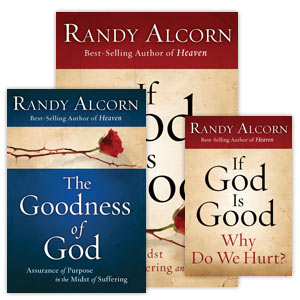 Similarly, after writing the comprehensive If God Is Good, I composed a booklet of the same name, a small book called The Goodness of God and a medium-sized devotional 90 Days of God’s Goodness.
Similarly, after writing the comprehensive If God Is Good, I composed a booklet of the same name, a small book called The Goodness of God and a medium-sized devotional 90 Days of God’s Goodness.
My small books greatly benefit from the extensive research done for my big books. Those who read the small and medium books profit from the years of work I invest in the big ones, even if they never read them. The smaller books allow me to focus not on researching new material, but on shaping what I’ve already discovered to fit the audience I’m trying to reach.
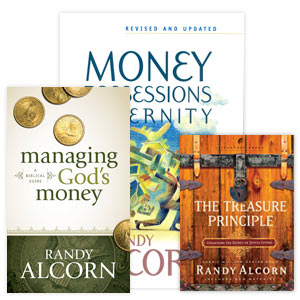 Those who prefer the big books enjoy passing on smaller ones to their believing and unbelieving friends. For instance, those who appreciate my extensive Money, Possessions and Eternity often give their friends my medium-sized Managing God’s Money or my small book on giving, The Treasure Principle, or The Law of Rewards. Money, Possessions and Eternity has reached a wide audience and, by God’s grace, had a life-shaping effect on the four founders of the world-impacting ministry Generous Giving (see www.generousgiving.org). While the big book uniquely influenced them, they’ve passed along not only it, but countless copies of the smaller books.
Those who prefer the big books enjoy passing on smaller ones to their believing and unbelieving friends. For instance, those who appreciate my extensive Money, Possessions and Eternity often give their friends my medium-sized Managing God’s Money or my small book on giving, The Treasure Principle, or The Law of Rewards. Money, Possessions and Eternity has reached a wide audience and, by God’s grace, had a life-shaping effect on the four founders of the world-impacting ministry Generous Giving (see www.generousgiving.org). While the big book uniquely influenced them, they’ve passed along not only it, but countless copies of the smaller books.
The Heaven and If God Is Good booklets have been used extensively to share the gospel. The Heaven booklet has sold as many copies as the Heaven book, each over a million. The booklet’s been handed out at countless funerals and memorial services. I’m praying my mini-book God’s Promise of Happiness might have similar impact. It uses the universal human longing for happiness as a bridge to the “good news of happiness” (Isaiah 52:7) in Jesus.
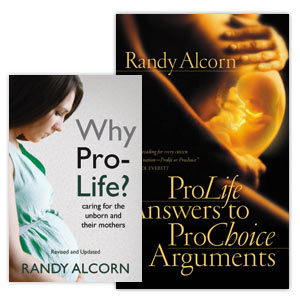 My first book Christians in the Wake of the Sexual Revolution, written in 1985, ultimately gave birth to my booklet Sexual Temptation and my little book The Purity Principle. My big book ProLife Answers to ProChoice Arguments helped shape my little books Pro-Choice or Pro-Life?, Why ProLife? (now out of print), ProChoice or ProLife?, and Does the Birth Control Pill Cause Abortions?
My first book Christians in the Wake of the Sexual Revolution, written in 1985, ultimately gave birth to my booklet Sexual Temptation and my little book The Purity Principle. My big book ProLife Answers to ProChoice Arguments helped shape my little books Pro-Choice or Pro-Life?, Why ProLife? (now out of print), ProChoice or ProLife?, and Does the Birth Control Pill Cause Abortions?
Surprisingly, my big books have consistently outsold the medium ones, and most of the small ones too. The one dramatic exception is The Treasure Principle, a small book, which has sold two million copies. While I write 2-3 small nonfiction books for every large one, it’s hard to measure their relative impact—the answer is always that some people benefit most from the big books, others from the small, and still others the medium-sized.
My big books have had the most impact on pastors, many of whom have based sermon series on them, thus influencing their churches. A pastor who’s been taught that happiness and joy are at odds, and we shouldn’t seek to be happy only holy, will need strong biblical, linguistic and historical evidence to change his thinking—that’s what I offer in the big book. Though the small book summarizes that evidence, and will be sufficient for some casual readers, serious students will need more. While some people will tune out discussions of the meaning of Scripture’s Hebrew and Greek words, others won’t be convinced unless those words are addressed.
In my experience, lay people—and Christian publishers—underestimate their ability to grapple with and understand theological and historical material. We can say no to the superficial “I don’t have time to think” mentality of modern culture. I’ve received many letters from people who’ve never been to college but have read, understood and benefited from my big books.
I delight in addressing a variety of subjects, and writing different lengths and types of books. One of my favorites is the little book The Grace and Truth Paradox.
Sometimes people criticize small books because “the author didn’t say anything about….” But there’s a lot of information small books can’t possibly include! Similarly, people criticize a large book because it deals in detail with theological issues that don’t interest them. But it’s not written for them. It’s for those who want a thorough treatment they can’t get elsewhere.
We shouldn’t criticize big books for not being a quick or easy read any more than we’d criticize a small book for not being comprehensive or a devotional book for not being scholarly. Usually they aren’t intended to be those things. They serve a different purpose.
That’s exactly why I write books that are big, medium and small, some more comprehensive, others more devotional, some for children, some for comic-lovers, some for those who enjoy murder mysteries. Not all people are alike, so not all books should be. It’s my joy and privilege to write different books on different subjects for different people, meeting different needs.
Paul said, “I have become all things to all people so that by all possible means I might save some” (1 Corinthians 9:22). What’s true in reaching people with the gospel is also true in teaching them God’s truth. Some want quick reads, with the cookies on the lower shelf. Others benefit more from reaching up to the counter and even the cupboard to get not only the cookies, but a lot more. Neither desire is wrong.
When it comes to books, “One size [or kind] does not fit all.” Different people from a variety of backgrounds, at different ages and stages of their lives, are changed by different sorts and sizes of books. My life has been shaped by all kinds of writings that have pointed me to God’s Book. I love writing different books to reach more people in more ways, by God’s grace, with the life-changing truths of His Word.



